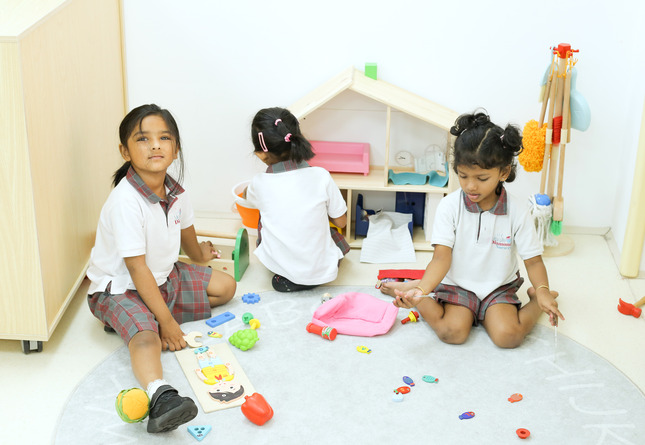The Role of Storytelling in Early Childhood Development
- September 18, 2024
- ChildDevelopment

Storytelling is a key way to share ideas. It helps kids grow in many ways. Parents and teachers use stories to teach. This makes learning fun and helps kids understand the world. Storytelling is not just for fun. It also teaches lessons, improves language, and sparks creativity.
Including storytelling in daily life boosts vocabulary, comprehension, and emotional intelligence. This article looks at how storytelling aids childhood development.
What is Storytelling in Early Childhood Development?
Storytelling shares experiences, ideas, or narratives, often with a lesson. In early childhood, it helps development, allowing children to learn and explore concepts.
Key benefits of storytelling in early childhood development:
Language Acquisition: Through hearing new words in context, children expand their vocabulary and improve sentence formation.
Cognitive Growth: Listening to stories helps children process information, make predictions, and understand sequencing.
Fostering Curiosity: Storytelling introduces children to new worlds, encouraging questions and exploration.
Storytelling also has a calming effect, creating a safe environment for children to express themselves, thus playing a major part in their overall growth and childhood Education.
The Cognitive Benefits of Storytelling
Storytelling greatly benefits children's minds by sparking their imagination. As kids hear stories, they picture characters, places, and events, boosting creative thinking.
Key cognitive benefits of storytelling:
Boosts Imagination: Storytelling takes children beyond their immediate world, sparking creativity.
Enhances Critical Thinking: Kids ask questions like "What happens next?" This fosters critical thinking and problem-solving.
Increases Attention Span: Storytelling teaches kids to focus on details, improving their concentration.
Aids Memory: Remembering story details boosts kids' memory, crucial for school success.
Storytelling in early childhood development engages the senses. It stimulates brain pathways, aiding cognitive growth.
Emotional Development Through Storytelling
Storytelling is vital for emotional growth. It helps children understand, express, and manage their emotions. Stories mirror real-life challenges like fear, sadness, and happiness. This connection aids children in relating to and understanding their own feelings.
Ways storytelling supports emotional development:
Building Empathy: Children learn to understand and respond to emotions in stories, like joy, anger, fear, and sadness.
Coping with Emotions: Stories help children process tough emotions. For instance, tales about overcoming fear can ease anxiety.
Developing Self-Awareness: Storytelling aids children in recognizing their feelings and reactions, boosting emotional intelligence.
Moral Lessons: Many stories teach right from wrong subtly.
Storytelling fosters social and emotional learning. It lets children safely experience various emotions.
Social Skills Fostered by Storytelling
Telling stories or listening to them in groups helps kids develop social skills. They learn to communicate, share thoughts, and listen, improving their social interactions.
Key social skills enhanced through storytelling:
Listening Skills: Children learn to pay attention and follow stories.
Collaborative Play: In groups, children take turns, fostering teamwork.
Verbal Expression: Discussing stories boosts children's confidence in expressing thoughts.
Role Playing: Adopting characters in stories enhances perspective-taking.
Storytelling is vital for children. It improves communication, idea sharing, and collaboration, thus aiding social skills.
Cultural Awareness and Storytelling
Storytelling is a powerful medium to introduce children to diverse cultures, customs, and values from around the world. Stories offer glimpses into different ways of life, fostering cultural awareness and appreciation.
How storytelling supports cultural awareness:
Learning About Diversity: Multicultural stories teach kids about different cultures, making them more open-minded.
Keeping Traditions Alive: Storytelling passes down values and traditions, helping kids connect with their heritage.
Fostering Tolerance: Stories from different cultures promote understanding and acceptance in kids.
Addressing Global Issues: Stories introduce topics like environmental protection and social justice in an accessible way.
Storytelling builds cultural understanding in children, shaping them into compassionate, globally aware individuals.
Storytelling and Language Development
Storytelling greatly impacts language development. It exposes children to richer vocabulary, varied sentence structures, and diverse language patterns. This, in turn, enhances their communication skills.
Key language development benefits:
Vocabulary Expansion: Stories introduce new words, aiding recall and daily use.
Sentence Formation: Different structures in stories teach children to create complex sentences.
Comprehension Skills: Following stories improves understanding of narratives, causes, and sequences.
Verbal Confidence: Storytelling boosts speaking skills through retelling or creating stories.
Storytelling helps develop language skills in early childhood. It boosts both understanding and expression.
Tips for Parents to Encourage Storytelling at Home
Parents can actively foster storytelling habits at home to support their child’s development. Here are some practical tips to incorporate storytelling into daily routines:
Effective ways to encourage storytelling at home:
Read Daily: Make reading a daily habit, like before bed or after meals.
Interactive Storytelling: Engage your child by asking for predictions or alternate endings.
Create Storytime Rituals: Set a special time and place for stories to make it a daily joy.
Encourage Story Creation: Ask your child to make up stories using toys or drawings.
Use Props: Bring stories to life with puppets, costumes, or simple props.
Use Audiobooks or Podcasts: Busy parents can use audiobooks or podcasts to spark imagination and introduce new stories.
Incorporating storytelling daily boosts development and fosters a love for reading and learning.
Conclusion
In conclusion, storytelling is key in early childhood. It boosts cognitive, emotional, social, and language skills. It sparks imagination, enhances problem-solving, teaches empathy, and encourages social interaction. Storytelling is vital at home and in classrooms for growth and development.
Parents, educators, and caregivers should use storytelling to foster learning, creativity, and emotional health. Let's encourage more storytelling to nurture empathetic and imaginative future generations.



